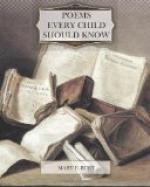I shall never hear her more
By the reedy Lindis shore,
“Cusha! Cusha! Cusha!”
calling,
Ere the early dews be falling;
I shall never hear her song,
“Cusha! Cusha!”
all along
Where the sunny Lindis floweth,
Goeth,
floweth;
From the meads where melick
groweth,
When the water
winding down,
Onward floweth
to the town.
I shall never see her more
Where the reeds and rushes
quiver,
Shiver,
quiver;
Stand beside the sobbing river,
Sobbing, throbbing, in its
falling
To the sandy lonesome shore;
I shall never hear her calling,
“Leave your meadow grasses
mellow,
Mellow,
mellow;
Quit your cowslips, cowslips
yellow;
“Come uppe, Whitefoot, come
uppe, Lightfoot;
Quit your pipes of parsley
hollow,
Hollow,
hollow;
Come uppe, Lightfoot, rise
and follow;
Lightfoot,
Whitefoot,
From your clovers lift the
head;
Come uppe, Jetty, follow,
follow,
Jetty, to the milking shed.”
JEAN INGELOW.
THE LYE.
“The Lye,” by Sir Walter Raleigh (1552-1618),
is one of the strongest and most appealing poems
a teacher can read to her pupils when teaching early
American history. The poem is full of magnificent
lines, such as
“Go, soul, the body’s guest.”
The poem never lacks an attentive audience of young
people when correlated with the study of North
Carolina and Sir Walter Raleigh. The solitary,
majestic character of
Sir Walter Raleigh, his intrepidity while undergoing
tortures inflicted by a cowardly king, the ring of
indignation—– all these make a weapon
for him stronger than the ax that beheaded him.
In this poem he “has the last word.”
Goe, soule, the bodie’s
guest,
Upon a thanklesse
arrant;
Feare not to touche the best—
The truth shall
be thy warrant!
Goe,
since I needs must dye,
And
give the world the lye.
Goe tell the court it glowes
And shines like
rotten wood;
Goe tell the church it showes
What’s good,
and doth no good;
If
church and court reply,
Then
give them both the lye.
Tell potentates they live
Acting by others’
actions—
Not loved unlesse they give,
Not strong but
by their factions;
If
potentates reply,
Give
potentates the lye.
Tell men of high condition,
That rule affairs
of state,
Their purpose is ambition,
Their practice
only hate;
And
if they once reply,
Then
give them all the lye.
Tell zeale it lacks devotion;
Tell love it is
but lust;
Tell time it is but motion;
Tell flesh it
is but dust;
And
wish them not reply,
For
thou must give the lye.




